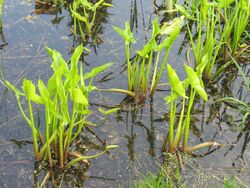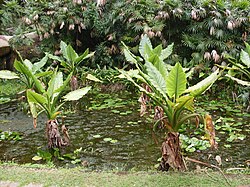Biology:Peltandreae
| Peltandreae | |
|---|---|

| |
| Peltandra virginica cultivated in the botanical garden in Göttingen, Germany | |

| |
| Typhonodorum lindleyanum cultivated in the Victoria Botanical Garden, Seychelles | |
| Scientific classification | |
| Kingdom: | Plantae |
| Clade: | Tracheophytes |
| Clade: | Angiosperms |
| Clade: | Monocots |
| Order: | Alismatales |
| Family: | Araceae |
| Subfamily: | Aroideae |
| Tribe: | Peltandreae Engl.[2][3] |
| Type genus | |
| Peltandra Raf. | |
| Genera | |
| |
Peltandreae is a tribe of plants in the arum family.[1][4]
Distribution
The distribution is disjunct. Peltandra is native to Eastern North America and the Caribbean (Canada, USA, Cuba)[5] and Typhonodorum is native to Africa (the Comoros, Madagascar, Mauritius, Tanzania).[6]
Taxonomy
Taxonomic history
The tribe was first described in 1876 by the German botanist Heinrich Gustav Adolf Engler (Engl.).[2][3] Engler placed Typhonodorum in a separate tribe Typhonodoreae.[7][8][9] However, it is now included in Peltandreae.[10][1]
Genera
Peltandreae consists of the following two genera:[4]
- Peltandra Raf.
- Typhonodorum Schott
Phylogeny
It is closely related to the European tribes Ambrosineae and Arisareae. These three tribes shared a common ancestor about 82.7 million years ago.[1] 60 Million years old Peltandreae fossils have been found in Europe, North America, and Central Asia.[4] Therefore, the group has existed for at least 60 Million years, as the evidence of the fossil record suggests,[4] but the analysis of the molecular clock suggests this group is about 82.7 million years old.[1]
The precise relationships are displayed in the following cladogram:[1]
| |||||||||||||||||||
References
- ↑ 1.0 1.1 1.2 1.3 1.4 1.5 Mansion, G., Rosenbaum, G., Schoenenberger, N., Bacchetta, G., Rosselló, J. A., & Conti, E. (2008). "Phylogenetic analysis informed by geological history supports multiple, sequential invasions of the Mediterranean Basin by the angiosperm family Araceae." Systematic Biology, 57(2), 269-285.
- ↑ 2.0 2.1 Peltandreae. (n.d.). NCBI Taxonomy Browser. Retrieved February 18, 2023, from https://www.ncbi.nlm.nih.gov/Taxonomy/Browser/wwwtax.cgi?mode=Info&id=293504&lvl=3&lin=f&keep=1&srchmode=1&unlock
- ↑ 3.0 3.1 Peltandreae Engl., 1887. (n.d.). Atlas - SINP De La Réunion. Retrieved February 18, 2023, from http://atlas.borbonica.re/espece/892514
- ↑ 4.0 4.1 4.2 4.3 Renner, S. S., & Zhang, L. B. (2004). Biogeography of the Pistia clade (Araceae): based on chloroplast and mitochondrial DNA sequences and Bayesian divergence time inference. Systematic Biology, 53(3), 422-432.
- ↑ "Peltandra Raf." (in en). Royal Botanic Gardens, Kew. http://www.plantsoftheworldonline.org/taxon/331259-2. Retrieved 18 February 2023.
- ↑ "Typhonodorum Schott" (in en). Royal Botanic Gardens, Kew. http://www.plantsoftheworldonline.org/taxon/2943-1. Retrieved 18 February 2023.
- ↑ Engler, A. (1876). "Vergleichende Untersuchungen über die morphologischen Verhältnisse der Araceae (Vol. 3)." Druck von E. Blochmann & Sohn für die Akademie in Commission bei Wilh. Engelmann in Leipzig.
- ↑ Boodle, L. A., & HILL, A. W. (1929). "Typhonodorum lindleyanum: The development of the embryo and germination of the seed." Annals of Botany, 43(171), 437-450.
- ↑ Engler, A. (1915). "Araceae-Philodendroideae-Anubiadeae, Aglaonemateae, Dieffenbachieae, Zantedeschieae, Typhonodoreae, Peltandreae."
- ↑ Typhonodorum. (n.d.). GBIF | Global Biodiversity Information Facility. Retrieved February 18, 2023, from https://www.gbif.org/species/103021699
Wikidata ☰ {{{from}}} entry
 |





